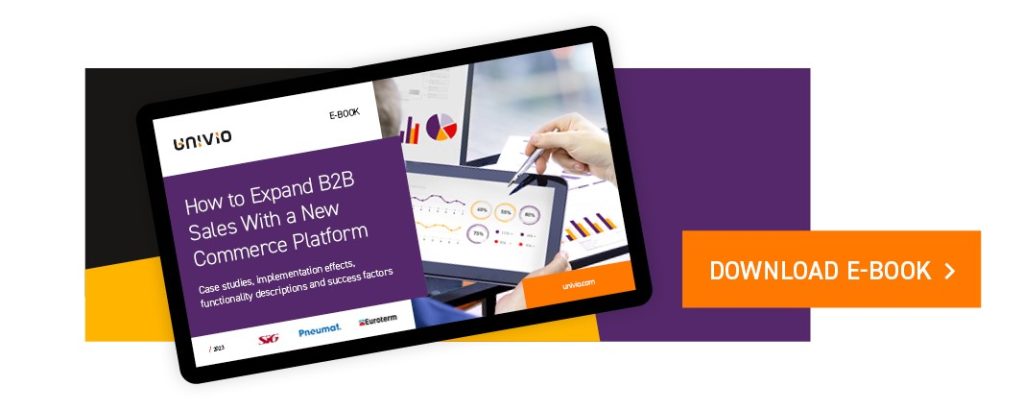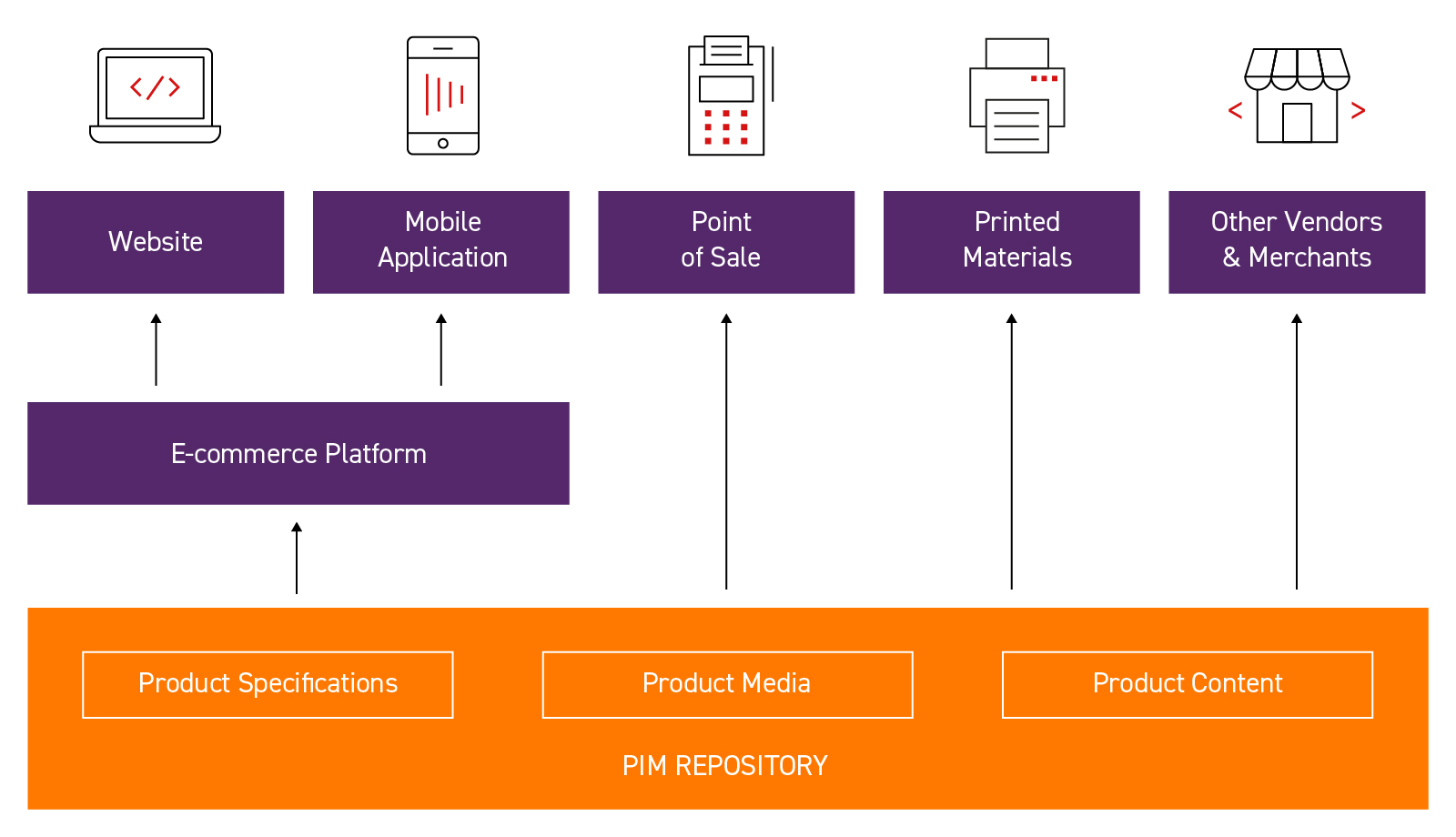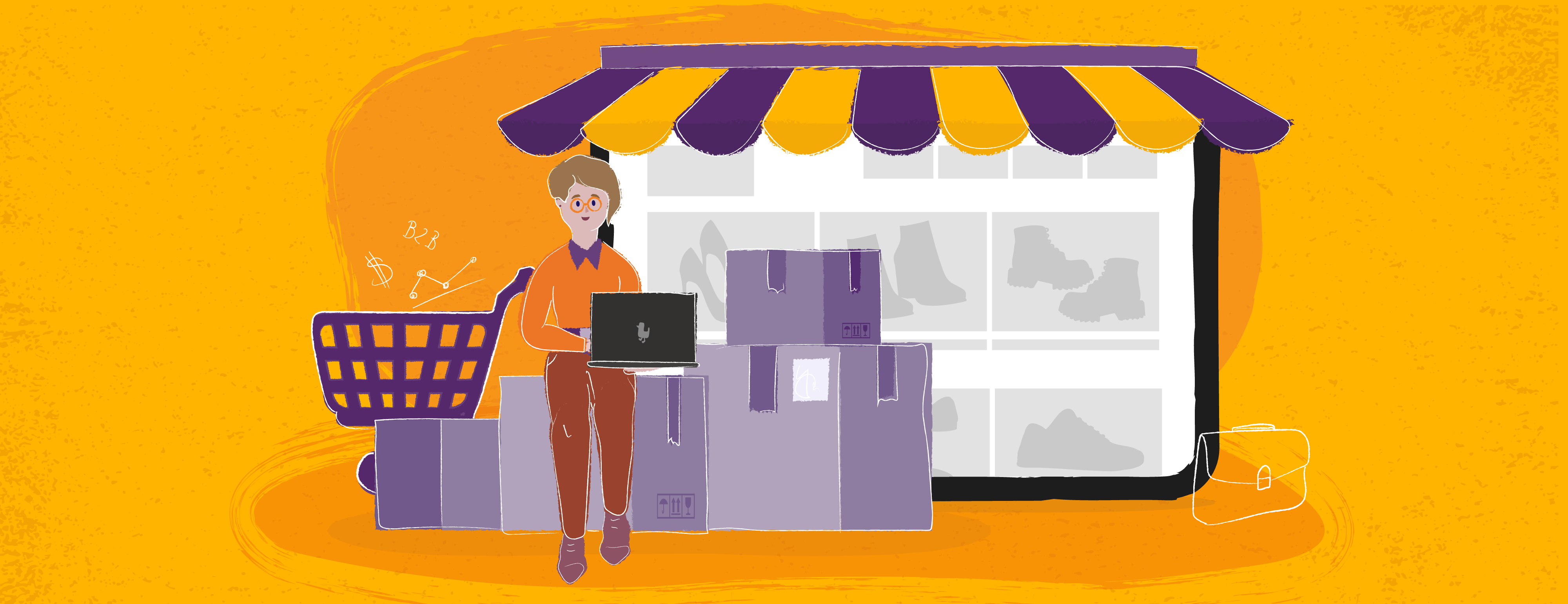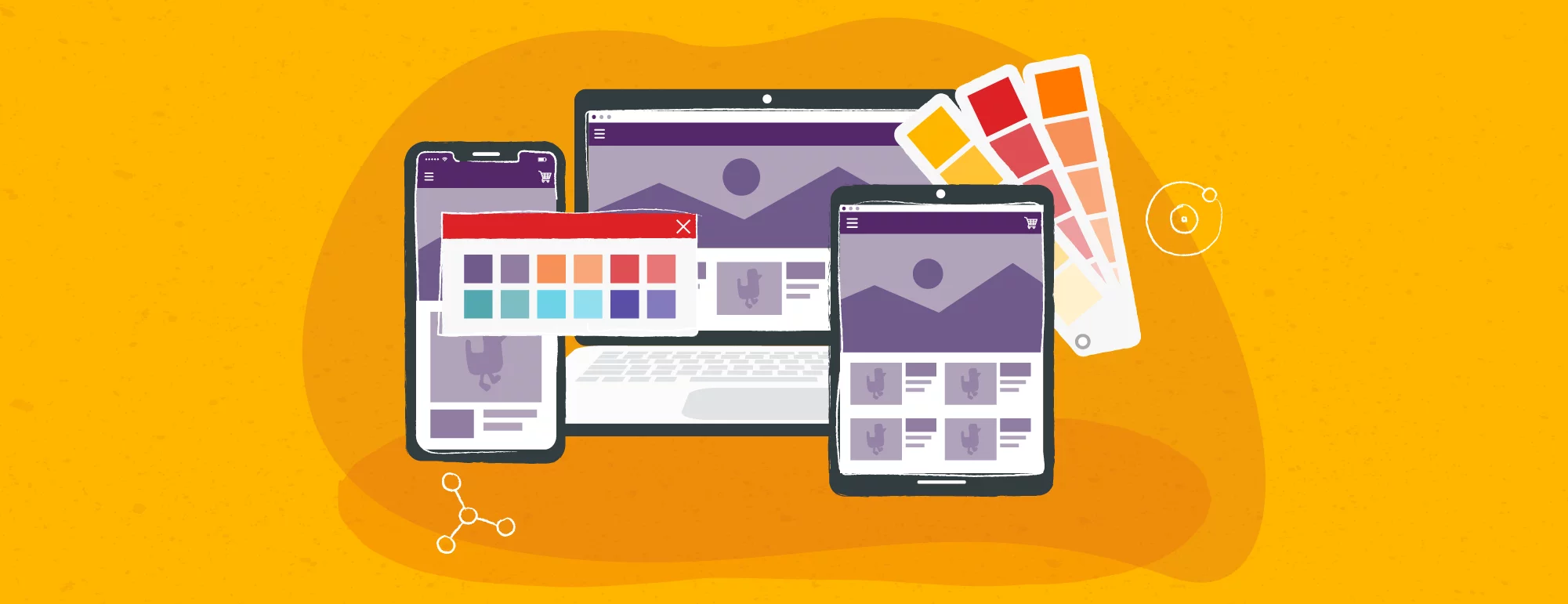E-commerce Platform / 11 Essential Features
As B2B customers are increasingly opting for the speed, ease and convenience of online shopping, a whopping 49% of B2B expenses occur online. What’s more, 68% of B2B buyers expect their reliance on digital sales channels to grow in the future.
Given the above, there can be only one conclusion: if your company has not yet embraced digital commerce transformation, this is the perfect time to do so. According to projections, in the next 5 years 57% of B2B purchases will be made online.
If you want to follow your customers, an agile, flexible e-commerce platform is a must. You should be aware, however, that many of the solutions available on the market don’t meet the requirements of the business-to-business sector. To address these problems, we have developed ONe B2B, a platform that helps you establish business relationships and achieve success in online sales.

1/ Two-Step Access
In the past, B2B platforms were reserved for a select group of customers. To access them, you had to log in. Today, things are different and advanced systems, such as ONe, offer two-tier access.
- The first level is a publicly accessible product catalog with the sole function of presenting catalog prices or additionally offering the ability to make purchases. This feature is a good start for developing D2C sales, bypassing intermediaries and selling directly to customers.
- The second level is a functional e-commerce system designed for business customers. After logging in, you can access the full product range with individually adjusted prices, delivery costs and additional product data, as well as stock level information.
Two-tier platforms, unlike closed ones, are also indexed and positioned by Google.
2/ Easy Operation and Compliance with UX trends
B2B platforms must comply with a different set of UX and design requirements, as intuitive and user-friendly interfaces and intuitive navigation are gaining in importance. Yet, the customer should not need to be trained to know how to use them. An e-commerce solution should be fully functional for both desktop and mobile ‒ ONe, for example, is built with PWA technology, making its online stores easy to use for smartphone users.
An appealing visual design is increasingly in demand with business customers. The B2B platform we have implemented for the brand Fale Loki Koki resembles a luxury online cosmetics store. The ONe platform provides ready-made solutions that are in synch with industry UX trends but allows for some leeway when it comes to graphic design.
3/ Customer Segmentation & Personalized Offering
Business has always been about relationships. They are the cornerstone for negotiating discounts, creating personalized price lists and offering more favorable terms. This means that flexible discounting and tailoring prices and sales policies to specific customer segments, or even individual customers, must be one of the key features of B2B platforms.
But there is more to it than the ability to set up advanced customer segments and personalize your product offering. The ONe B2B e-commerce system also allows you to tailor marketing messages, create promotional scenarios and customize delivery terms to specific groups of wholesale customers such as those who order more than others.

4/ Up-Selling & Cross-Selling
Up-selling and cross-selling are associated with B2C sector online stores that use a recommendation system, but ONe also offers this feature too. You can set the order in which products are displayed in the search results and prompts. The platform also enables displaying sets and selling related products. This function can boost higher-margin products, support the sale of non-rotating goods and help increase the value of the business customer’s shopping cart.
5/ Expanded Product Presentation
When it comes to product presentation, the needs of business customers are slightly different than those of retail consumers. First of all, they don’t ‘buy with their eyes’ and their choices are rarely impulse-driven.
Of course, the display of the right kind of images is essential but up-to-date product data is even more crucial. The ONe platform can be easily integrated with an external PIM system (such as Erogonode, ETIM-Mapper, Pimcore or Akeneo), which acts as the brain of the product information management process.
Having this component outside your e-commerce system allows you to create an independent data repository from which you can send information to multiple online stores, partners and subcontractors. If you decide to change platforms (however unlikely this scenario might be) or launch another sales channel, you can continue distributing all the data collected in the PIM system.

6/ Payment Methods Tailored to Business Customers
Business customers want to pay for their purchases quickly, easily and securely, as this is what they get when they shop online as retail customers. A B2B platform should offer a payment system that is convenient for buyers and sellers alike. Order processing starts immediately after payments are quickly identified and linked to orders.
75% of business customers say that a credit card is their preferred method of payment. Deferred payments, or trade credit, is also common, with almost 70% of buyers using this option. In addition to these, ONe can be integrated with a prompt online payment system and offers the options of prepayment and cash on delivery. B2B customers are also increasingly turning to mobile.
7/ Merchant Panel & Building Business Relationships
What sets the ONe platform apart is the merchant panel. It is a very advanced part of the backend that ensures efficient sales. In comparison to user accounts in B2C stores, it offers many more options. The merchant panel is the command center used by staff responsible for sales and customer relationships.
A merchant panel should offer the following features to support sales and facilitate customer care:
- Easy access to all key documents and to the entire order history (both online and offline).
- Ability to place orders on behalf of customers.
- Access to key customer information (including a preview of orders and shopping carts, as well as the ability to respond, for example, by offering discounts to encourage more purchases).
- Online quoting function.
- Notifications and alerts for key events.
Another useful feature is the ability to assign tasks to sales personnel by, among others, the sales director. Using this function, you can efficiently manage processes and better plan the work of your team.

8/ Multiple Shopping Carts
Another extremely useful feature of ONe is the ability to create multiple shopping carts when placing orders. It is especially useful for contractors who have multiple subsidiaries or plan purchases for a number of different departments. Multiple carts allow for optimal purchase planning and the customization of deliveries of different shipments.
9/ Optimizing Logistics
In 2021, more than four out of ten B2B buyers struggled in one way or another with the delivery and tracking of online orders, so this area certainly needs improvement. Support for multiple warehouses, which is a key feature of the ONe e-commerce platform, enables a selected range of products and available warehouses to be presented, as well as delivery methods and logistics service methods dedicated to selected customer segments. Customers can also divide their carts into in-stock and out-of-stock products, splitting the delivery or deciding to wait with until all products are available.
For non-standard size products, defining the shipping method and cost in advance might be challenging. In the ONe platform, this problem is solved as follows: the product is marked as available on RFP, and then all the delivery details are agreed.
10/ Advanced Search Tool
An advanced search tool, tailored to the needs of B2B customers, enables you to find the products you look for quickly and conveniently. In B2C, customers search for products by typing in product features such as color, size, style or price.
Business customers, by contrast, tend to use product names, ID numbers, manufacturer IDs, EAN/GTI parameters and category. Searching for synonyms in specific categories, contextual search and the prompt function are also very helpful.
11/ Capacity to Grow
The architecture of the ONe B2B platform uses AWS (Amazon Web Services), whose computing power and capacity changes to reflect growing business volumes. This provides an excellent basis for expanding the number of product indexes and customers as sales grow, including through rollouts in new markets.
We can both expand the number of customers with similar expectations and use the platform as a base for dedicated solutions, tailored to the needs of the most demanding businesses.
This rapidly adaptable server performance makes e-commerce perfectly capable of handling sudden traffic peaks during promotions, including Black Friday.
Conclusion
Implementing an e-commerce platform may seem a daunting task, but with the global B2B e-commerce market expected to reach $18.97 trillion by 2028, there is certainly a fat slice of the pie to vie for. A key part of this commerce digitization can come in the form of scalable B2B e-commerce platforms such as ONe.
The solution is available via SaaS (Software as a Service), which ensures quick, seamless implementation and flexible use of pre-built modules. Developed in consultation with commerce practitioners, it is perfectly tailored to the needs of business.
Do you want to learn more about B2B platforms? Let’s talk!








